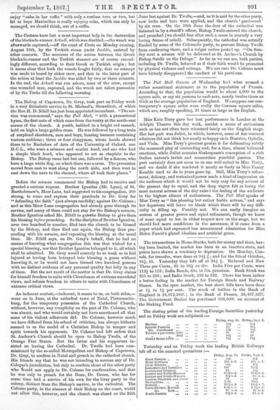Miss Kate Terry gave her last performance in London at
the Adelphi Theatre this day week, amidst a scene of enthusiasm such as has not often been witnessed lately on the English stage. Her last part was Juliet, in which, however, some of her warmest admirers did not think her nearly so happy as in Beatrice, Ophelia, and Viola. Miss Terry's greatest genius is for delineating subtly the measured play of contending and, for a time, almost balanced emotions, while Juliet contains Shakespeare's conception of a rich Italian nature's lavish and measureless youthful passion. The part certainly does not seem to us one well suited to Miss Terry, and we doubt if she rendered it nearly so finely as Miss Fanny Kemble used to do in years gone by. Still, Miss Terry's refine- ment, delicacy, and restrained power made a kind of impression on the audience which it would not be very easy for any actress of the present day to equal, and the deep regret felt at losing the most natural actress of the day raises the feeling of the audience to the highest climax of enthusiasm. The Pall Mall speaks of Miss Terry as " this pleasing but rather feeble actress," and says her departure will leave no blank which there will be any diffi- culty in filling up. Possibly not. We can easily imagine an actress of greater power and equal refinement, though we know of none equal to her in either respect now on the stage, but we should feel more confidence in the assurance, if it came from a paper which had expressed less unmeasured admiration for Miss Helen Faucit's glazed idealism and artificial grace.






























 Previous page
Previous page